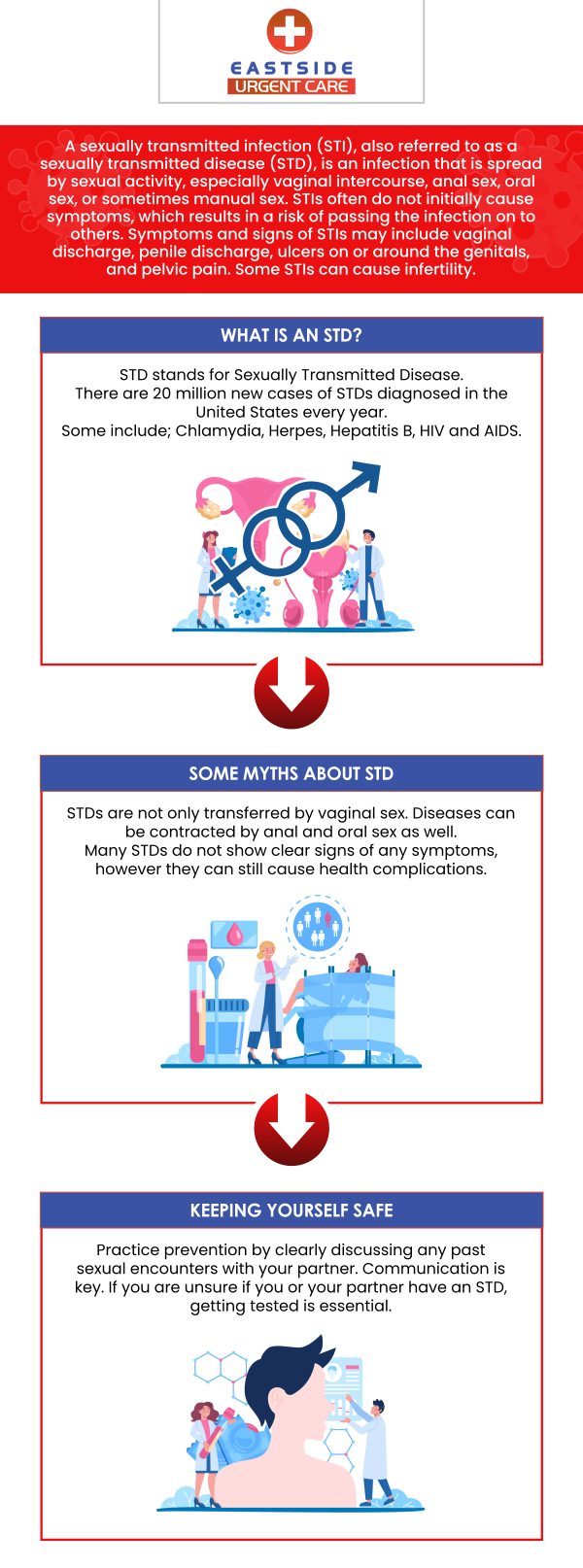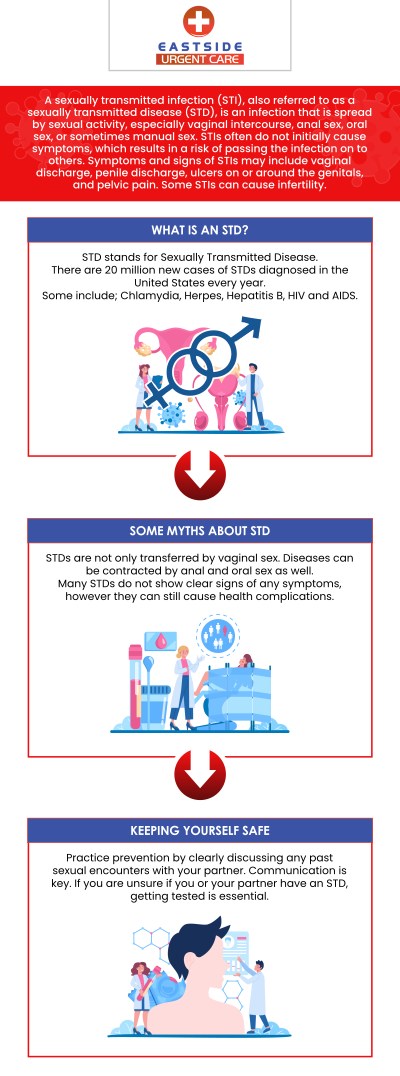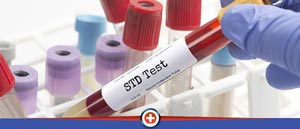Do Normal Blood Tests Show STDs?
Blood tests can identify a wide range of sexually transmitted diseases (STDs), such as chlamydia, herpes, syphilis, HIV, and hepatitis B and C. While STD testing is not usually included in a regular blood panel, it can be done through bloodwork. You will need to discuss your concern with your healthcare provider in an open and truthful way to get the right diagnostics, as they will need to know about your symptoms. At Eastside Urgent Care, Dr. Noor U. Hassan, MD, and Dr. John Pressler, MD can test for sexually transmitted diseases (STDs) at our clinic. For more information, contact us or book an appointment. We are conveniently located at 872 Ohio Pike Cincinnati, OH 45245.




Table of Contents:
Do Normal Blood Tests Show STDs?
What are the first signs of an STD?
What is included in standard STD testing?
When Do STDs Show Up on a Blood Test?
Which STDs can be checked with a blood test?
Sexually transmitted diseases (STDs) are infections that can be contracted through sexual contact. They can cause a wide range of symptoms and complications if left untreated. It is important to detect STDs early to prevent further spread and to receive appropriate treatment.
The first signs of an STD can vary depending on the specific infection, but some general symptoms include:
• Lesions or protuberances on the genital area, anus, or oral cavity.
• Painful or burning urination
• Unusual discharge from the penis or vagina
• Symptoms such as itching, redness, or irritation in the genital area may be experienced
• Abnormal vaginal odor
• Anal itching, soreness, or bleeding
• Bleeding between periods
It’s important to note that not all STDs cause noticeable symptoms, especially in the early stages. This is why regular testing is crucial, even if you don’t experience any symptoms.
STD testing typically involves a combination of physical exams, laboratory tests, and sometimes, imaging scans. While blood tests can be part of the standard testing process, they may not detect all types of STDs. The specific tests used may vary depending on the healthcare provider and the individual’s risk factors.
Common STD testing methods include:
Physical Examination: A healthcare provider may visually inspect the genital area for signs of sores, bumps, or other abnormalities.
Urine Test: This test is commonly used to detect infections such as chlamydia and gonorrhea. The process entails providing a urine sample, which is subsequently examined in a laboratory for analysis.
Swab Test: Swabs may be taken from the genital area, anus, or throat to collect samples for testing. These swabs can detect infections like herpes and syphilis.
Blood Test: While blood tests are not the primary method for detecting most STDs, they can be useful in certain cases. Blood tests can identify antibodies or antigens associated with specific infections, such as HIV or syphilis.
The timing of when STDs can be detected through a blood test depends on the specific infection. Some STDs, like HIV and syphilis, can be detected through blood tests within a few weeks to months after exposure. However, other infections, such as chlamydia and gonorrhea, cannot be reliably detected through blood tests alone. These infections typically require urine or swab tests for accurate diagnosis.
It’s important to remember that the window period, which is the time between exposure to an infection and when it can be reliably detected, varies for each STD. If you suspect you may have been exposed to an STD, it is best to consult with a healthcare provider who can recommend the appropriate testing method and timing.
While blood tests may not be the primary method for diagnosing most STDs, there are several infections that can be detected through blood tests. These include:
• Human Immunodeficiency Virus (HIV): A blood test can detect antibodies or antigens associated with HIV infection. Early detection is crucial for managing and treating HIV.
• Syphilis: Blood tests can detect antibodies produced in response to syphilis infection. Timely detection and treatment play a crucial role in averting potential complications.
• Hepatitis B and C: Hepatitis B and C infections can be detected through blood tests that look for specific antibodies or antigens.
It’s vital to remember that the availability and accuracy of blood tests may vary, and it is always best to consult with a healthcare professional for personalized advice and testing options.
In conclusion, while normal blood tests can detect some STDs like HIV and syphilis, they are not the primary method for diagnosing most infections. STD testing typically involves a combination of physical exams, urine tests, swab tests, and sometimes, blood tests. The specific testing methods used depend on the healthcare provider and the individual’s risk factors.
If you suspect you may have been exposed to an STD or are experiencing any symptoms, it is important to seek medical attention and discuss your concerns with a healthcare provider at Eastside Urgent Care. They can recommend the appropriate testing methods and provide guidance on the prevention, treatment, and management of sexually transmitted infections. For more information, contact us or book an appointment. We are conveniently located at 872 Ohio Pike Cincinnati, OH 45245. We serve patients from Cincinnati OH, Covedale OH, Delhi OH, St Bernard OH, Wilders KY, and Elmwood Place OH.

Additional Services You May Need
▸ Asthma
▸ Bronchitis
▸ DOT Physical
▸ Employment Drug Screen
▸ Illness
▸ Injury
▸ Insect and Animal Bites
▸ Occupational Medicine
▸ Pediatric Visit
▸ Pre-OP Physical
▸ School & Sports Physicals
▸ STD And Treatment
▸ Rash/Allergic Reaction
▸ Stomach Flu Treatment

Additional Services You May Need
▸ Asthma
▸ Bronchitis
▸ DOT Physical
▸ Employment Drug Screen
▸ Illness
▸ Injury
▸ Insect and Animal Bites
▸ Occupational Medicine
▸ Pediatric Visit
▸ Pre-OP Physical
▸ School & Sports Physicals
▸ STD And Treatment
▸ Rash/Allergic Reaction
▸ Stomach Flu Treatment



